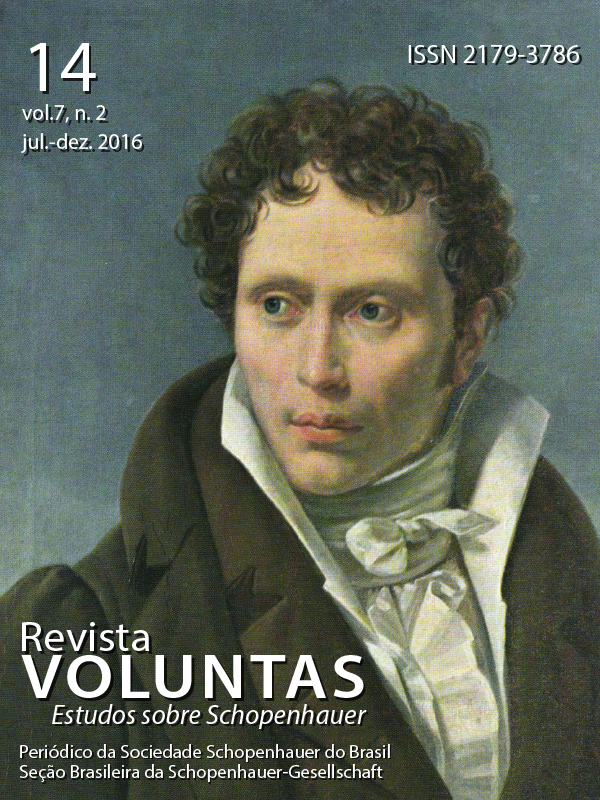O encontro de Schopenhauer com o pensamento indiano: influência e legitimidade
DOI:
https://doi.org/10.5902/2179378633700Parole chiave:
Schopenhauer, pensamento indiano, influência, legitimidadeAbstract
O presente artigo tem como objetivo apresentar diferentes posicionamentos sobre o encontro de Schopenhauer com o pensamento indiano. A pergunta sobre a influência e a legitimidade desse encontro e alvo de debate entre indólogos e intérpretes de Schopenhauer e há mais de um século está longe de possibilitar uma única resposta.
Downloads
Riferimenti bibliografici
SCHOPENHAUER, Arthur. Sämtliche Werke. Hrsg. von Arthur Hübscher. 7 Bde. Wiesbaden: F. A. Brockhaus, 1972.
SCHOPENHAUER, Arthur. Der Handschriftliche Nachlaß. Hrsg. von Arthur Hübscher. 5 Bde. Frankfurt am Main: Verlag Waldemar Kramer, 1966-1975.
SCHOPENHAUER, Arthur. Gesammelte Briefe. Hrsg. von Arthur Hübscher. Bonn: Bouvier, 1987.
SCHOPENHAUER, Arthur. De la quadruple Racine du príncipe de raison suffisante. Librairie Phiposophique J. Vrin, Paris, 1991.
SCHOPENHAUER, Arthur. O mundo como vontade e como representação. Tomo I. Trad. Jair Barboza. São Paulo: Unesp, 2005.
SCHOPENHAUER, Arthur. Seis ensaios de Parerga e Paralipomena, pequenos escritos filosóficos. Trad. Rosana Jardim Candeloro. Porto Alegre: Editora Zouk, 2016.
ANQUETIL-DUPERRON (trad.). Oupnek’hat. 1801 (primeiro tomo) e 1802 (segundo tomo).
APP, Urs. Notes and Excerpts by Schopenhauer Related to Volumes 1-9 of the Asiatick Researches. Schopenhauer-Jahrbuch, Bd. 79, 1998, pp. 11-33.
APP, Urs. Schopenhauer’s India Notes of 1811. Schopenhauer-Jahrbuch, Bd. 87, 2006 pp. 15-31.
APP, Urs. Schopenhauer’s Initial Encounter with Indian Thought. Schopenhauer-Jahrbuch, Bd. 87, 2006, pp. 35-76.
BERGER, Douglas. A question of influence: Schopenhauer, Early Indian Thought and a Critique of Some Proposed Conditions of Influence. In: Schopenhauer and Indian Philosophy: a dialogue between India and Germany. Edited by Arati Barua. New Delhi: Northern Book Centre, 2008, pp. 80-117.
APP, Urs. "The Veil of Maya": Schopenhauer's System and Early Indian Thought. Binghamton: Global Academic Publishing, 2004.
CLARKE, J. J. Oriental Enlightenment: The Encounter Between Asian and Western Thought. London-New York: Routledge, 1997.
CROSS, Stephen. Schopenhauer’s Encounter with Indian Thought, Representation and Will and their Indian Parallels. Honolulu: University of Hawai’i Press, 2013.
DEUSSEN, Paul. Allegemeine Einleitung und Philosophie des Veda bis auf die Upanishad’s. Leipzig: F. A. Brockhaus, 1922.
DEUSSEN, Paul. Wie ich zu Schopenhauer kam. Schopenhauer-Jahrbuch, Bd. 1, 1912, pp. 13-18.
GESTERING, Johann Joachim. German pessimism and Indian philosophy: a hermeneutic reading. Delhi: Ajanta Publications: Distributors, Ajanta Books International, 1986.
GLASENAPP, Helmuth von. The Influence of Indian Thought on German Philosophy and Literature’, Calcutta Review 29, 1928, 203.
GOUGH, Archibald Edward. The Philosophy of the Upanishads and Ancient Indian Metaphysics. 3ª ed. London: Kegan Paul, Trench, Trübner & CO. Ltda., 1903.
HALBFASS, Wilhelm. India and Europe. Motilal Banarsidass Publishers PVT. LTD. Delhi, 1990.
HALBFASS, Wilhelm. Philology and Confrontation: Paul Hacker on traditional and Modern Vedanta. Albany, NY: State University of New York Press, 1995.
HECKER, Max F. Schopenhauer und die indische Philosophie. Ko ln, 1897.
JANAWAY, Christopher. Schopenhauer – Past Masters (1996).
JANAWAY, Christopher (Ed.). The Cambridge Companion to Schopenhauer. Oxford: Cambridge University, 1999.
KEITH, Arthur Berriedale. The Religion and Philosopy of the Veda and Upanishads. Delhi: Motilal Barsidass, 1976.
MOCKRAUER, Franz. Schopenhauer und Indien. Einleitende worte zu den ero rterungen u ber das thema Europa und Indien. Schopenhauer-Jahrbuch, Bd. 15, 1928, pp. 3-26.
NICHOLLS, Moira. The Influences of Eastern Thought on Schopenhauer’s Doctrine of the Thingin-Itself. In: The Cambridge Companion to Schopenhauer. Christopher Janaway (Ed.). Cambridge University Press, 1999, pp. 171-212.
SEDLER, Jean. India in the mind of Germany: Schelling, Schopenhauer and their times. Washington D.C: University Press of America, 1982
##submission.downloads##
Pubblicato
Come citare
Fascicolo
Sezione
Licenza
La presentazione degli originali a questa rivista implica il trasferimento, da parte degli autori, dei diritti di pubblicazione stampate e digitali alla stessa, fatta eccezione dei diritti d'autore, che per gli articoli pubblicati rimangano all’autore, con diritti periodici sulla prima pubblicazione. Gli autori possono utilizzare gli stessi risultati solo in altre pubblicazioni che indicano chiaramente questa rivista come pubblicazione originale. Poiché siamo una rivista ad accesso aperto, consentiamo l'uso gratuito di articoli in applicazioni educative, scientifiche e non commerciali, a condizione che venga menzionata esplicitamente la fonte.






